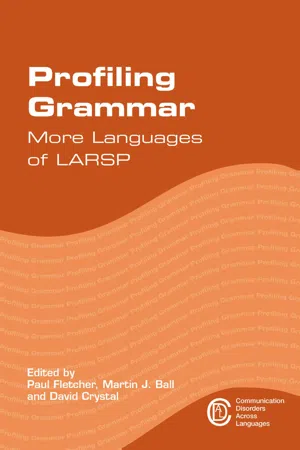![]()
1Afrikaans LARSP: Past and Future?
Claire Penn and Heila Jordaan
Introduction
The language assessment, remediation and screening procedure (LARSP) first came to South Africa in the mid-1970s, where its application to the languages of South Africa became immediately evident. Language clinicians used the tool in multiple settings both diagnostically and clinically and a number of studies were conducted and the method adapted into locally relevant programs (see, for example, Jordaan & Lewis, 1990; Lewis & Penn, 1989). South Africa is a multilingual country and language policy has been at the forefront of recent constitutional and educational changes. The new constitution of the country recognizes 11 official languages and contains aspirational clauses on the right of all individuals to have access to all spheres of South African society by developing and maintaining a level of spoken and written language … in the official language(s) of their choice. This has naturally had an impact on clinical linguistics. Clinical and educational professions have been challenged by the need to develop culturally and linguistically relevant tools. In South Africa, where practically every inhabitant is bi- or multilingual, there is daily interface of languages and language use is coupled strongly with sociopolitical identity. There is a lack of suitable assessment tools for individuals with language pathology and a well-documented difficulty with applying standardized tests to such populations (Pascoe & Norman, 2011; Pascoe et al., 2013; Penn, 1998). This is obviously compounded by the high level of illiteracy, particularly in the older generations, and the fact that for many children in the country the language of schooling and of therapy does not match the language of the home (Alexander, 2010; Brock-Utne & Skattum, 2009; Heugh, 2009). The notion of profiling thus becomes compelling and authentic. One language for which LARSP has been applied is Afrikaans.
History and Current Status of Afrikaans
Afrikaans is one of the languages unique to South Africa and, despite its relatively short history, is one of the most studied and documented. Its development reflects the fascinating complexity of the country and its history is intimately linked to the periods of major political upheaval and transformation. Afrikaans originated in the mid-1600s – derived from Hollands (a Dutch dialect from Amsterdam) and Portuguese – when the early Dutch settlers, the indigenous Khoikhoi and the slaves of African and Asian descent needed to develop a common language of communication (Den Besten, 1989; Raidt, 1984; Roberge, 1995). The subsequent history is summarized in Table 1.1 and information in this section has been compiled from various sources (Alexander, 1989, 1997, 2001; Extra & Maartens, 1998; Hartshorne, 1995; Heugh, 1995, 2002; Pluddeman, 1999; Reagan, 1986; Rose & Tunmer, 1975; Webb, 1995). In the new democracy, 11 official languages are recognized and given equal status in the constitution. However, the implementation of these provisions has been slow and English has become dominant in all spheres of public life, often at the expense of the other languages, in...
